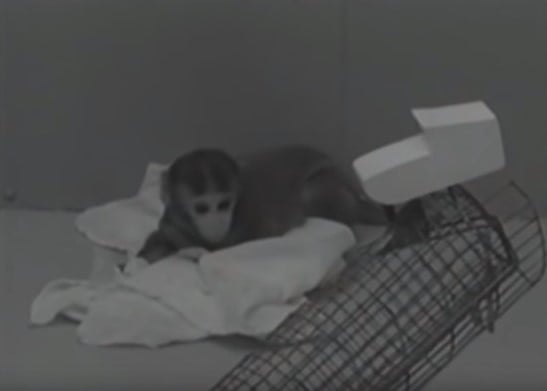
In the 1950s and 60s, at the University of Wisconsin, baby rhesus monkeys were kept in small barren cages where different groups were socially isolated for the first three, six, and twelve months of their lives. During these times, the baby monkeys had no contact with their mothers or other monkeys. These experiments, led by Harry Harlow, were conducted over several years to discover the effects of such isolation on later development.
Isolated for 3, 6, and 12 months
As related by Dworetzky in his book Introduction to Child Development, the findings generally demonstrated that three months of isolation produced few long-term deficits but that six months or more of isolation caused severe developmental disturbances. The monkeys in the latter category began to bite themselves. They held onto themselves and rocked back and forth. Their emotions became bizarre; they made strange facial grimaces and sometimes lashed out in rage or fear. Some monkeys isolated for a year became so withdrawn that they seemed little more than “semi-animated vegetables.”
In these “monkey labs,” researchers investigated factors related to the effects of early isolation and stimulus deprivation. They discovered that the timing of the isolation was as important as its duration. Monkeys isolated later in life were less severely affected than those whose isolation began at birth. They also discovered that the females seemed less affected by early isolation than males and that another species of monkey, the pigtail monkey, was not as severely affected by early isolation as the rhesus.
The primary concern of the researchers was not necessarily to discover the effects of early experiences on the later development of monkeys but to generalize their monkey data to human beings.
.
Harry Harlow conducting his experiments
.
Changing a child development theory
As sad as Harlow’s monkey experiments were, at the time, poorly researched “child development theory” was advising parents not to kiss, hug, cuddle, or give their children any attention aside from feeding, bathing, and disciplining them. Children of these generations were often raised in cold, sterile homes, and many had detachment disorders.
Harlow couldn’t experiment on human infants, but he showed parents and pediatricians the damage they were doing to their children and the entire generation by these cold, inhumane parenting methods.
Ultimately, the monkey experiments changed much of child development theory to relay the truth: children need more than just food but also love, touch, and cuddling. It saved millions of children from bleak, sterile, loveless childhoods and saved those people’s children from parents who were incapable of love or attachment.
.

